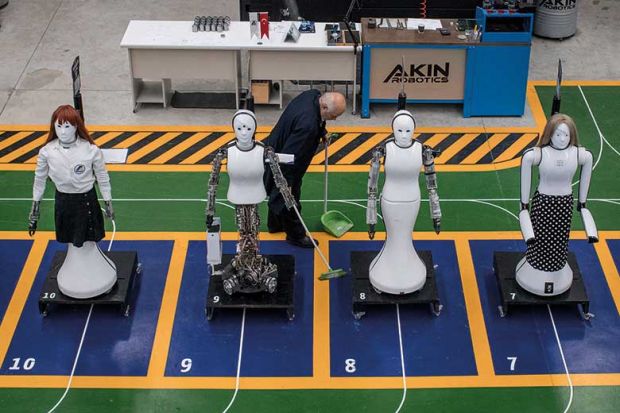Robot rights is a timely topic, and one that is often met with an attitude of “How absurd!” But as David Gunkel explains here, it warrants close investigation in a world where machines play an increasingly active role. Discussion of the topic is no easy task when there isn’t even expert consensus on what constitutes a robot – a subject the author dissects admirably in his opening chapter.
Over the years, the very idea of robots having rights has been considered ridiculous. However, Gunkel reminds us, so too initially was the idea of rights for animals, for example – or, indeed, for any previously excluded human population. He encourages us to explore the unthinkable, whether we consider robots as tools to serve us or as entities that may one day have human-like cognitive abilities.
The book opens with a discussion of Hume’s philosophical distinction between “is” and “ought”. Are robots able to have rights, and, if so, ought they? Gunkel examines the case from four key standpoints: robots cannot have rights and therefore should not; robots can have rights and therefore should; robots can have rights but should not; and even if robots cannot have rights, they should have them. Each chapter offers a thorough and well-evidenced exploration of current thinking, explaining in detail both the arguments and the complications arising from those arguments.
Overall, Gunkel concludes, none of these four standpoints solves the problem definitively or really advances the debate, so his final chapter seeks an alternative, based on the ideas of the philosopher Emmanuel Levinas. This suggests a deconstruction of the issue, putting the “should” before the “can”. What we need, remarks Gunkel, is a move to asking why we have even arrived at the question of robot rights in the first place. Perhaps, he says, it is only when we encounter and interact with a robot that we should make the decision about whether or not that robot should have rights.
Robot Rights is a compelling read. It dives deeply into philosophy from the very start, but it’s accessible and well structured, and useful and informative for anyone interested in the social impact of emerging technologies. “Words matter in this debate,” writes Gunkel, and his precise definitions and etymologies attest to that. The endnotes are a treasure trove of fascinating asides, clarifications and anecdotes.
The author is not calling for a revolution on behalf of the machines. Instead, he’s showing us what we need to know in order to learn how to go forward in a society where robots will become more and more prevalent. “Developing and debating the rights of robots does not necessarily take anything away from human beings and what (presumably) makes us special,” writes Gunkel – and he’s correct. For too long, we’ve dismissed the social status of robots as something to worry about in the future, but there’s no time like the present to examine our interactions and responsibilities – and Robot Rights provides the philosophical signposts we need.
Kate Devlin is senior lecturer in social and cultural artificial intelligence in the department of digital humanities at King’s College London.
Robot Rights
By David J. Gunkel
MIT Press, 256pp, £27.00
ISBN 9780262038621
Published 6 November 2018
Register to continue
Why register?
- Registration is free and only takes a moment
- Once registered, you can read 3 articles a month
- Sign up for our newsletter
Subscribe
Or subscribe for unlimited access to:
- Unlimited access to news, views, insights & reviews
- Digital editions
- Digital access to THE’s university and college rankings analysis
Already registered or a current subscriber? Login








